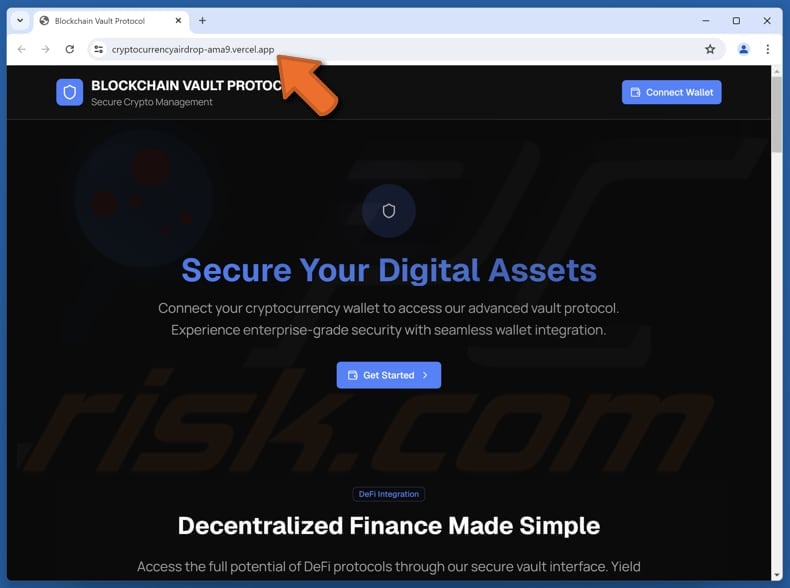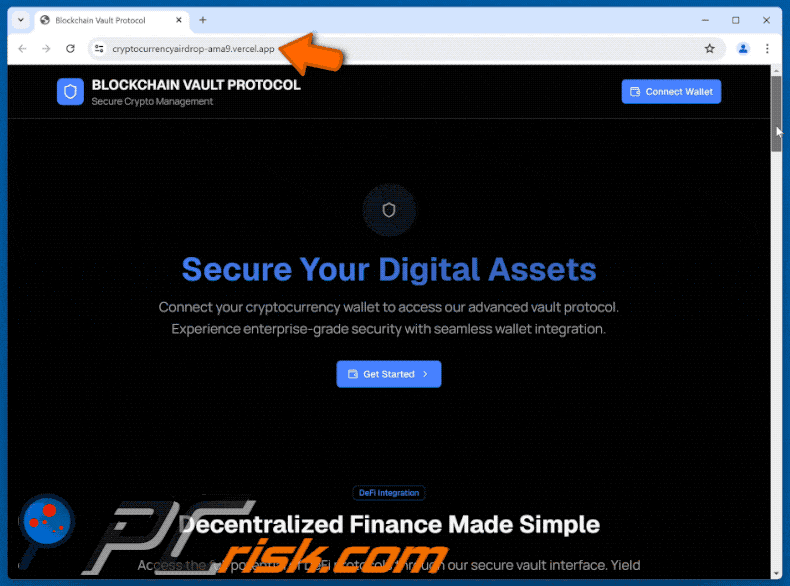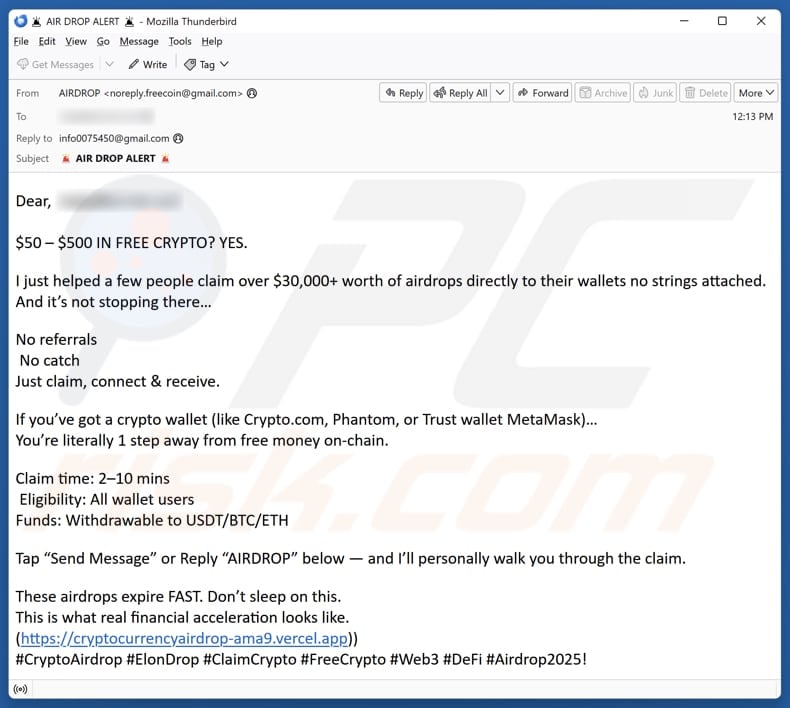How to spot scams like "Fake Blockchain Vault Protocol"
Phishing/ScamAlso Known As: Bogus Blockchain Vault Protocol
Get free scan and check if your device is infected.
Remove it nowTo use full-featured product, you have to purchase a license for Combo Cleaner. Seven days free trial available. Combo Cleaner is owned and operated by RCS LT, the parent company of PCRisk.com.
What is the "Fake Blockchain Vault Protocol"?
Our team has inspected the website (cryptocurrencyairdrop-ama9.vercel[.]app) and found that it uses deception to extract personal information from unsuspecting visitors. The ultimate goal is to steal cryptocurrency. Therefore, this scam website should not be trusted and should be closed if ever opened.

"Fake Blockchain Vault Protocol" in detail
This scam is promoted through email. Scammers send emails offering free cryptocurrency airdrops ranging from $50 to $500. They claim that users can easily claim funds without referrals or hidden conditions. Their emails state that funds can be withdrawn in USDT, BTC, or ETH within minutes.
Following the link provided in these scam emails leads to a fake website claiming that users can secure their digital assets by connecting their cryptocurrency wallets. This site presents an advanced vault protocol with enterprise-grade security and promises seamless wallet integration to make the service appear legitimate.
The purpose of this scam is to trick individuals into sharing their secret phrases required to access wallets. Once these phrases are disclosed, attackers can immediately transfer funds to their wallets. Because blockchain transactions are irreversible, victims lose their assets permanently.
Thus, it is important to be careful with suspicious websites and emails and always ensure that offers are legitimate before sharing personal information or taking other steps to avoid monetary loss (or other issues).
| Name | Bogus Blockchain Vault Protocol |
| Threat Type | Phishing, Scam, Social Engineering, Fraud |
| Fake Claim | Users can participate in various airdrops |
| Disguise | Legitimate platfrom for finding crypto giveaways |
| Related Domain | cryptocurrencyairdrop-ama9.vercel.app |
| Detection Names | N/A (VirusTotal) |
| Symptoms | Unofficial domain, lack of official verification, unrealistic claims, too good-to-be-true promises |
| Distribution methods | Fake social media accounts, deceptive websites, rogue online advertisementsm, scam emails |
| Damage | Loss of sensitive private information, monetary loss. |
| Malware Removal (Windows) |
To eliminate possible malware infections, scan your computer with legitimate antivirus software. Our security researchers recommend using Combo Cleaner. Download Combo CleanerTo use full-featured product, you have to purchase a license for Combo Cleaner. 7 days free trial available. Combo Cleaner is owned and operated by RCS LT, the parent company of PCRisk.com. |
Conclusion
In conclusion, this scam uses emails offering free cryptocurrency airdrops to lure victims to fake websites that request sensitive wallet information. By convincing users to share their secret phrases, scammers can steal funds instantly, and victims can suffer permanent losses.
More examples of crypto-related scams are "AI-POWERED IQ TEST", "APRO ($AT) Airdrop", and "MegaETH Token Distribution".
How did I open a scam website?
Users end up on scam websites in multiple ways. Scammers create or hijack social media accounts (mainly Twitter/X or Facebook accounts) or use stolen WordPress pages to promote fraudulent schemes. Clicking on misleading links, buttons, or ads on untrustworthy websites can also redirect users to scam pages.
Additionally, scam sites spread through deceptive browser notifications, fraudulent emails containing malicious links or attachments, adware, and unreliable advertising networks found on torrent sites, adult platforms, streaming services, and other unsafe websites.
How to avoid visiting scam pages?
Refrain from opening attachments or following links in unexpected emails or messages from unfamiliar or questionable senders. Use official websites or app stores to download applications, software, or files. Avoid interacting with pop-ups, advertisements, or links on suspicious websites, and refuse to get notifications from untrustworthy pages.
Furthermore, ensure your operating system and applications are regularly updated, and run frequent scans using trusted security software. If your computer is already infected with unwanted apps, we recommend running a scan with Combo Cleaner Antivirus for Windows to automatically eliminate them.
The appearance of "Fake Blockchain Vault Protocol" scam (GIF):

A scam email promoting the "Fake Blockchain Vault Protocol":

Text in this email:
Subject: AIR DROP ALERT
Dear, ********
$50 – $500 IN FREE CRYPTO? YES.
I just helped a few people claim over $30,000+ worth of airdrops directly to their wallets no strings attached. And it's not stopping there...
No referrals
No catch
Just claim, connect & receive.If you've got a crypto wallet (like Crypto.com, Phantom, or Trust wallet MetaMask)...
You're literally 1 step away from free money on-chain.Claim time: 2–10 mins
Eligibility: All wallet users
Funds: Withdrawable to USDT/BTC/ETHTap "Send Message" or Reply "AIRDROP" below — and I'll personally walk you through the claim.
These airdrops expire FAST. Don't sleep on this.
This is what real financial acceleration looks like.
(-))
#CryptoAirdrop #ElonDrop #ClaimCrypto #FreeCrypto #Web3 #DeFi #Airdrop2025!
Instant automatic malware removal:
Manual threat removal might be a lengthy and complicated process that requires advanced IT skills. Combo Cleaner is a professional automatic malware removal tool that is recommended to get rid of malware. Download it by clicking the button below:
DOWNLOAD Combo CleanerBy downloading any software listed on this website you agree to our Privacy Policy and Terms of Use. To use full-featured product, you have to purchase a license for Combo Cleaner. 7 days free trial available. Combo Cleaner is owned and operated by RCS LT, the parent company of PCRisk.com.
Quick menu:
- What is Bogus Blockchain Vault Protocol?
- How to identify a pop-up scam?
- How do pop-up scams work?
- How to remove fake pop-ups?
- How to prevent fake pop-ups?
- What to do if you fell for a pop-up scam?
How to identify a pop-up scam?
Pop-up windows with various fake messages are a common type of lures cybercriminals use. They collect sensitive personal data, trick Internet users into calling fake tech support numbers, subscribe to useless online services, invest in shady cryptocurrency schemes, etc.
While in the majority of cases these pop-ups don't infect users' devices with malware, they can cause direct monetary loss or could result in identity theft.
Cybercriminals strive to create their rogue pop-up windows to look trustworthy, however, scams typically have the following characteristics:
- Spelling mistakes and non-professional images - Closely inspect the information displayed in a pop-up. Spelling mistakes and unprofessional images could be a sign of a scam.
- Sense of urgency - Countdown timer with a couple of minutes on it, asking you to enter your personal information or subscribe to some online service.
- Statements that you won something - If you haven't participated in a lottery, online competition, etc., and you see a pop-up window stating that you won.
- Computer or mobile device scan - A pop-up window that scans your device and informs of detected issues - is undoubtedly a scam; webpages cannot perform such actions.
- Exclusivity - Pop-up windows stating that only you are given secret access to a financial scheme that can quickly make you rich.
Example of a pop-up scam:

How do pop-up scams work?
Cybercriminals and deceptive marketers usually use various advertising networks, search engine poisoning techniques, and shady websites to generate traffic to their pop-ups. Users land on their online lures after clicking on fake download buttons, using a torrent website, or simply clicking on an Internet search engine result.
Based on users' location and device information, they are presented with a scam pop-up. Lures presented in such pop-ups range from get-rich-quick schemes to fake virus scans.
How to remove fake pop-ups?
In most cases, pop-up scams do not infect users' devices with malware. If you encountered a scam pop-up, simply closing it should be enough. In some cases scam, pop-ups may be hard to close; in such cases - close your Internet browser and restart it.
In extremely rare cases, you might need to reset your Internet browser. For this, use our instructions explaining how to reset Internet browser settings.
How to prevent fake pop-ups?
To prevent seeing pop-up scams, you should visit only reputable websites. Torrent, Crack, free online movie streaming, YouTube video download, and other websites of similar reputation commonly redirect Internet users to pop-up scams.
To minimize the risk of encountering pop-up scams, you should keep your Internet browsers up-to-date and use reputable anti-malware application. For this purpose, we recommend Combo Cleaner Antivirus for Windows.
What to do if you fell for a pop-up scam?
This depends on the type of scam that you fell for. Most commonly, pop-up scams try to trick users into sending money, giving away personal information, or giving access to one's device.
- If you sent money to scammers: You should contact your financial institution and explain that you were scammed. If informed promptly, there's a chance to get your money back.
- If you gave away your personal information: You should change your passwords and enable two-factor authentication in all online services that you use. Visit Federal Trade Commission to report identity theft and get personalized recovery steps.
- If you let scammers connect to your device: You should scan your computer with reputable anti-malware (we recommend Combo Cleaner Antivirus for Windows) - cyber criminals could have planted trojans, keyloggers, and other malware, don't use your computer until removing possible threats.
- Help other Internet users: report Internet scams to Federal Trade Commission.
Frequently Asked Questions (FAQ)
What is a scam website?
It is a deceptive online platform created to trick visitors by making false promises, showing misleading content, or using other methods to persuade users to engage with it.
What is the purpose of a scam page?
In most cases, scammers use these schemes to steal money (including cryptocurrency) or personal information, or to trick users into downloading malicious software.
Why do I encounter fake scams?
Users often encounter scam websites through misleading links, fake ads, emails, social media, or notifications from untrustworthy platforms. They can also be directed to these sites via rogue advertising networks, commonly present on torrent sites, adult content platforms, or illegal streaming services.
Will Combo Cleaner protect me from scams?
Combo Cleaner analyzes websites and can detect those that are harmful. This includes scam sites, enabling the app to warn users and prevent access.
Share:

Tomas Meskauskas
Expert security researcher, professional malware analyst
I am passionate about computer security and technology. I have an experience of over 10 years working in various companies related to computer technical issue solving and Internet security. I have been working as an author and editor for pcrisk.com since 2010. Follow me on Twitter and LinkedIn to stay informed about the latest online security threats.
PCrisk security portal is brought by a company RCS LT.
Joined forces of security researchers help educate computer users about the latest online security threats. More information about the company RCS LT.
Our malware removal guides are free. However, if you want to support us you can send us a donation.
DonatePCrisk security portal is brought by a company RCS LT.
Joined forces of security researchers help educate computer users about the latest online security threats. More information about the company RCS LT.
Our malware removal guides are free. However, if you want to support us you can send us a donation.
Donate
▼ Show Discussion